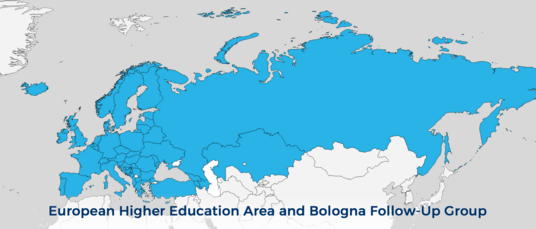

Since 1999 commitments to promote the common European higher education have been negotiated at regular intervals in 48 countries so far. These countries are represented in the European Bologna follow-up group and its thematic working groups. In order to fulfil the now substantial Bologna goals step by step new points of focus are fixed at the end of each negotiation cycle, i.e. every three years, jointly at ministerial meetings or else the willingness to continue to pursue the goals that have been set is affirmed.
These aims are for example:
- creation of a three-tier study system (bachelor – master – PhD/doctoral studies)
- framework conditions for increased mobility of students, lecturers, researchers and (non-) academic/artistic higher education staff
- easier recognition of nationally and internationally acquired degrees or study parts
- preservation of the democracy policy aspects regarding freedom of science and teaching, the student-centred approach and in the dealing with students as well as academia from crisis areas
- acquisition of professional and personal skills in the course of one’s studies and the related internships in order to increase the employability of higher education graduates and junior researchers
- promotion of transnational joint degrees and simplified procedures for international accreditations
- innovative teaching that also takes into account digital teaching and learning methods and heterogeneity of the students
- national strategies regarding the social dimension of studying (opening up of higher education institutions, study conditions and study progress, tuition fees, compatibility of studies, family and job, …)
- transparent, institutionalised and quality-based permeability between different studies, degrees and also between the educational sectors, especially between vocational and academic education
- quality assurance in teaching and quality development of the higher education institutions
The following transparency tools of the European higher education area facilitate the comparability of the individual national (higher) education systems and frameworks:
- the European Credit Transfer and Accumulation System (ECTS) and the related Guide 2015
- quality assurance and the related ESG Guide 2015
- the learning outcomes and skills orientation as a basis for fair recognition of achievements made at other higher education institutions and to compare skills gained by means of higher education and outside higher education
- qualifications frameworks as systematic presentations of formal educational qualifications where there are different levels that are explained by special characteristics (“descriptors”)
- the diploma supplement with uniform specifications to describe higher education degrees and the qualifications associated with them
The OeAD supports the integration of the Bologna goals in the Austrian higher education landscape. The OeAD’s Bologna team understands itself as a cross-sectional and independent advice and information centre for the whole Austrian higher education sector and for the national Bologna experts. It serves as a practical point of contact for questions, concerns and suggestions regarding Bologna and the European higher education area. A central concern is to work on a common understanding of the Bologna goals in a cross-sectional way and to strengthen Austria as a location for higher education in this way.
